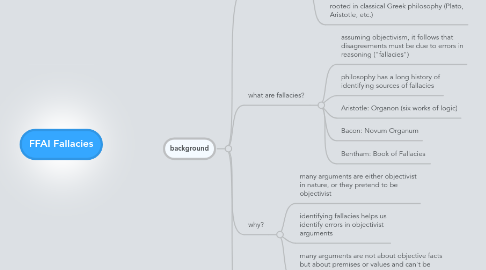
1. background
1.1. objectivist view
1.1.1. objectivity: facts and propositions are true independent of individual minds
1.1.2. major proponents: 19th century German philosophers (Kant, Frege, etc.)
1.1.3. rooted in classical Greek philosophy (Plato, Aristotle, etc.)
1.2. what are fallacies?
1.2.1. assuming objectivism, it follows that disagreements must be due to errors in reasoning ("fallacies")
1.2.2. philosophy has a long history of identifying sources of fallacies
1.2.3. Aristotle: Organon (six works of logic)
1.2.4. Bacon: Novum Organum
1.2.5. Bentham: Book of Fallacies
1.3. why?
1.3.1. many arguments are either objectivist in nature, or they pretend to be objectivist
1.3.2. identifying fallacies helps us identify errors in objectivist arguments
1.3.3. many arguments are not about objective facts but about premises or values and can't be resolved by identifying fallacies
1.4. sources
1.4.1. use of fallacies may be accidental or deliberate
1.4.2. accidental use is probably often based on confirmation bias: people construct a fallacious argument and don't question it because it supports their conclusions
2. Common Fallacies ... or how arguments go wrong
2.1. examples of material fallacies
2.1.1. irrelevant conclusions, "truth / falsehood" by association"
2.1.1.1. "people who believe this are motivated by ..." (ad hominem)
2.1.1.2. "lots of people believe this, so it must be true" (ad populum)
2.1.1.3. "if this were true, it would be horrible, so it can't be true" (ad baculum)
2.1.1.4. "experts / people who are right about a lot of other things believe this, so this must be true too" (ad verecundiam)
2.1.1.5. "the data supporting this view comes from people who mistreat kittens, so the conclusion can't be true"
2.1.2. correlation / causation
2.1.2.1. non sequitur: the conclusion may be related to, but doesn't logically follow, from the premise
2.1.2.2. post hoc ergo propter hoc: temporal correlation does not imply causation
2.1.2.3. cum hoc ergo propter hoc: co-occurrence does not imply causation
2.1.3. common logic errors
2.1.3.1. errors in deductive reasoning, misapplication of induction
2.1.3.2. "Rain causes the ground to be wet. Therefore, if the ground is wet, it must have rained."
2.1.4. misdirection
2.1.4.1. straw man: "you're really saying something else and that is false because..."
2.1.4.2. begging the question: "kittens are cute because young felines are cute"
2.1.4.3. no true Scotsman: "Christians are moral because anybody who commits an immoral act can't be a Christian"
2.2. examples of verbal fallacies
2.2.1. equivocation
2.2.1.1. "Do women have to worry about man-eating sharks"?
2.2.2. amphiboly
2.2.2.1. "He only said that..." (he said just one thing / the thing he said wasn't all that significant"
2.2.3. composition and division
2.2.3.1. "Bacon, ice cream, and potato chips are very tasty. Therefore, mixing them all together must make a very tasty meal."
2.2.3.2. "I love cookies. Cookies are composed of starch, oil, and sugar, therefore, starch, oil, and sugar are some of my favorite foods."
2.3. meta-fallacy
2.3.1. "'A is true because...' is a fallacy implies that A must be false."
